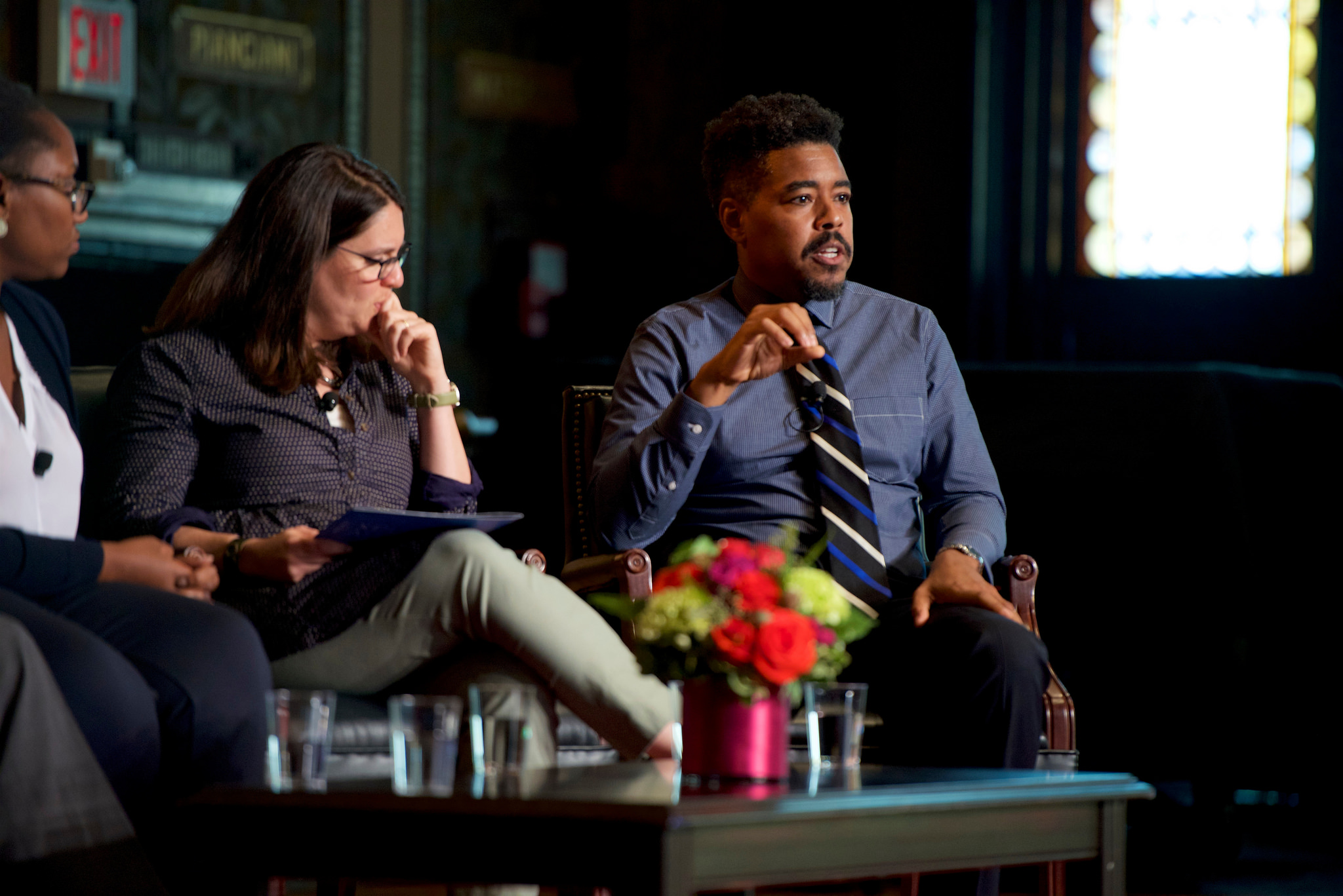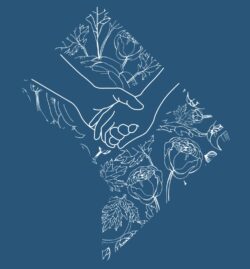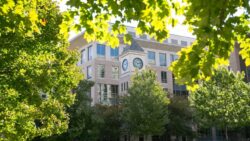A giant painting sits on the floor of Professor Terrence Johnson’s office, among the hundreds of books lining the shelves, the African sculptures on the side table and desk, and drawings made by his children taped to the walls. The painting is of a woman’s face in shadow, a student’s final project for his Philosophy of Liberation class. It’s inception came out of Johnson’s desire to have students be more creative with their work: He wants to show off their different talents and not just confine them to essays and tests.
Johnson is an associate professor of Religion and Government and an affiliate professor in the Department of African-American Studies. Johnson sits on the executive committee of the Center for Jewish Civilization, and he is also a faculty fellow at the Berkeley Center for Religion, Peace, and World Affairs. Johnson’s appointments and positions in all these departments are certainly impressive, but there’s more to the professor than just his CV.
“He pushes you to think critically and really engage with the material,” said Omi Okunola (COL ’20), a teaching assistant for Blacks and Jews in America, a course co-taught by Johnson. “To put it plainly, Johnson is an intellectual, and here at Georgetown, he attempts to make us all life-long intellectual thinkers.”
Johnson wants his students to engage—not to just be passive observers—and to work to better themselves and their communities through active conversation. In his lectures, he speaks with authority, but his style is personal. Johnson can make a panel discussion in Gaston Hall feel like a one-on-one conversation.
“My prayer is that my students will also then take these conversations to help think about how do we restructure our institutions so that we have a real true sense of what it means to interact with the other and have deep conversations with people we disagree with,” Johnson said. “But then take that disagreement and create something so that these structures allow more opportunities for people to engage them.”
Gueinah Blaise (COL ’20), another teaching assistant for Johnson’s Blacks and Jews class, explained that the professor is not afraid to “push the envelope” when it comes to discussions in class. “You know how some professors will have egos and only want you to regurgitate what they tell you?” she wrote in an email to the Voice. “That’s just not who he is as a professor.”
Blaise recognizes the importance Johnson puts on communication and dialogue in his classes. “I do remember getting into a discussion/debate with him last year when I took Blacks and Jews as a student over black pride and what it means to be a black person with a homelands—I’m from Haiti—and a history tied to a successful slave revolt,” Blaise wrote. “I remember thinking, sometime toward the end of the debate, how cool it was that while I felt challenged, my opinions and analysis of these themes were being listened to and processed by him not just to prove a point but to simply understand.”
Johnson grew up in Fort Wayne, Indiana, and graduated from Morehouse College in 1993, getting his undergraduate degree in English literature. He has a master’s from Harvard Divinity School and earned his doctorate in religious studies from Brown University in 2008.
“We’re often judged by if you can do one thing really well,” Johnson said. “I think while I love the breadth of my interests, it’s also very difficult, and I’m still struggling with how to make sure it’s always coherent but also always accessible to the people who are going to validate me as a professor.”
Johnson began his career teaching at Haverford College, a small liberal arts school in Pennsylvania and said that his favorite course was one of his first: Religion and Public Life.
“The class was powerful, not necessarily because of the content, but because I had a wealth of brilliance in the room,” he said. “I felt so much energy from my students, and I was able to take that energy and grow as a teacher. It’s often not necessarily the courses that are my favorite, but it was those students. It was like magic in the air.”
Johnson started teaching in 2007, the same year he got married to his wife, Jill. Johnson said the items he cherishes most of all the accoutrements scattered around his office are his children’s drawings and a picture of his family. It’s his roots, his family of past and present, that provide him with the most inspiration, especially in his professorial path.
“My grandmother and my mother were really instrumental in pushing education. I think because my grandmother was a sharecropper and mom spent her life working in a factory, I was always inspired by their work ethic and their ability to overcome a number of odds within their contexts,” Johnson said. “That was sort of one level of inspiration in terms of a certain kind of resiliency that I acquired.”
A variety of books populate the shelves of his office, ranging in subject from literary analysis to philosophy to African-American culture and politics. He praised the work of Toni Cade Bambara and John Edgar Wideman, calling the former’s work “superb” and “profound.” He half-jokingly ended his commentary by saying these were just his favorite authors of the week.
But there was one book in his collection, one author who has been the cause of immense inspiration for Johnson’s teaching and writing. It was something he read in high school.
“My first college trip ever, I came to Washington, D.C., and my mentor told me I needed to read Du Bois’ Soliloquy,” Johnson said. “And I picked it up, and it really changed my life.”
He got up from his chair and picked the book up off the shelf in his office.
“It changed my life, in part because he’s such a prolific writer, but also, he’s dangerous enough that when I read him in high school, my principal asked me, ‘Why are you reading this guy? He’s a communist, he’s not American,’” Johnson said. “So when he said that I thought, maybe I should read more.”
It is safe to say he read a lot more. Johnson wrote an entire book about Du Bois, entitled Tragic Soul-Life: W.E.B. Du Bois and the Moral Crisis Facing American Democracy, published in 2012. He spoke about Du Bois as an intellectual guide, someone who has inspired him in his life and career path.
“I really admire his desire to want to bring to light traditions that were ignored and often looked upon in disdain,” Johnson said.
As someone who has both studied and learned from African-American theology and culture, the traditions of the black church have framed Johnson’s life experiences.
“When we look at the role of the black church in wanting to develop people who are both spiritually sound but also equipped to interact in a diverse world and to prepare them to resist segregation and to find a place in the public sphere, I think that’s pretty incredible,” he said.
But although black Christian tradition is Johnson’s background, he sees this as an underpinning to engage with other religious traditions. “I think what’s very powerful about my experience in the black church is it’s allowed me to develop a deep capacity to hear and to learn from other traditions as well,” he said. “My more traditional friends would say I’m not really Christian at all because I don’t adhere to a kind of orthodoxy. But when I look at the ideals of the African-American church, I see those ideals as very opening and very welcoming, even when some communities within that tradition don’t reflect the best of it.”
Some of Johnson’s students appreciated Johnson’s approach to introducing the basics of theology in class. “Instead of simply presenting a survey class of world religions or tackling ‘traditional’ Christian theological issues, he asked us to consider the interaction between religion and marginalized groups,” wrote former student Sam Seitz (SFS ’19, SSP ’20) in an email to the Voice.
Johnson’s emphasis on religion includes his admiration for the Jesuit educational tradition.
“Clearly it’s problematic in terms of slavery, but in terms of ideals of the Jesuits and of Catholicism, I think it makes Georgetown an incredible and fertile place for the deep conversations I want to happen,” he said.
This semester, Johnson is lecturing in the government department on the intersections of visual art and literature with political and religious ideals of African-Americans. As always, pushing his students to engage in dialogue is one of his focuses. “I’m thinking you guys are smarter than we were when we went to college,” he said. “So why not give you guys more freedom?”
For Johnson’s students, the rigorous expectations he brings to class are an invitation to excel.
He has high hopes for them. The Religion and Public Life class that he taught at Haverford years ago was so special in part because a few of those students went on to become professors themselves. Leaning forward in his chair, he gave advice to his students to seek out more from their education.
“I would like to see students become more involved in shaping the intellectual life of the campus,” Johnson said. “I want students to not simply see themselves as consumers but to see themselves as knowledge producers. And as knowledge producers, I want them to demand more of the institution. And that’s what I want, that they demand more from us.”





